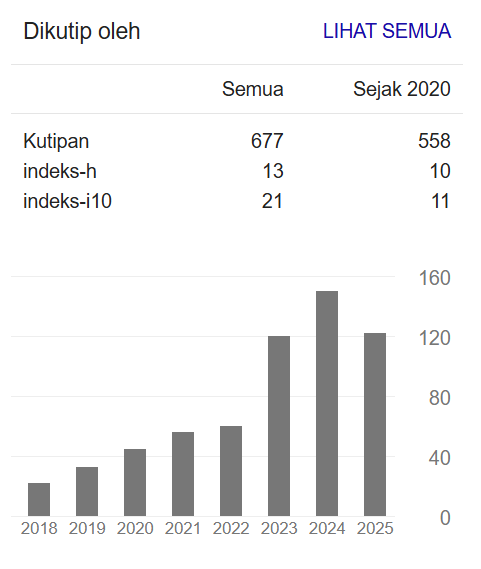MULLĀ ṢADRĀ'S CRITICISM OF REINCARNATION
DOI:
https://doi.org/10.20871/kpjipm.v9i1.274Keywords:
Eschatology, Mullā Ṣadrā, Reincarnation, Resurrection of the Soul and Body, Substantial Movement of the SoulAbstract
The concept of reincarnation is believed to be the rebirth of humans in the world as a form of part of their life journey in accordance with their actions during life with various forms of reincarnation—including being able to be reborn as humans or animals. This article aims to discuss Mullā Ṣadrā’s eschatological thoughts, especially his criticism of the concept of reincarnation which has been believed by Hindus and Buddhists. Reincarnation is a topic of discussion for philosophers including Islamic philosophers in discussing the spirit, soul, body, death, and resurrection. Ṣadrā’s rejection of the concept of reincarnation is found in one of his main works entitled al-Asfār al-Arba‘ah. By using analytical and descriptive methods, it was concluded that Mullā Ṣadrā rejected the concept of reincarnation with his five philosophical arguments, including the natural unity argument, the material and form needs argument, Kawn and Fasād’s argument, the vacuum argument, and the argument with five premises. These philosophical arguments are based on Ṣadrā’s main philosophical principle, namely the substantial movement of the soul. Even though he rejects the concept of reincarnation, Ṣadrā still believes in the resurrection of the soul and body after death, which will continue the journey towards the highest perfection in the afterlife.
Downloads
References
Arsyad, Arsyad. 2018. “Konsep Gerak Mulla Sadra: Suatu Tinjauan Filsafat.” Jurnal Konfrontasi 5 (1): 33–49. https://www.konfrontasi.net/index.php/konfrontasi2/article/download/22/31.
Asmariani, Anak Agung Raka. 2021. “Tujuan Manusia dan Jalan untuk Mencapainya menurut Advaita Vedanta.” Sanjiwani: Jurnal Filsafat 12 (2): 233–243. https://doi.org/10.25078/sjf.v12i2.2702.
Bakar, Abu. 2012. “Konsep Ibadah dalam Hindu.” Jurnal Toleransi: Media Ilmiah Komunikasi Umat Beragama 4 (2):195–205. http://dx.doi.org/10.24014/trs.v4i2.950.
Dhammananda, Sri. 2007. Keyakinan Umat Budha. Kuala Lumpur: Pustaka Karaniya.
Eliade, Mercia. 1987. Encyclopedia of Religion. New York: Macmillan Company.
Fajar, Dadang Ahmad. 2018. “Jiwa dalam Pandangan Mulla Shadra.” Jaqfi: Jurnal Aqidah dan Filsafat Islam 3 (1): 13-31. https://doi.org/10.15575/jaqfi.v3i1.9551.
Farābī, Abū Nāṣr al-. 1345. Al-Siyāsah al-Madaniyyah. India: Dā’irah al-Ma‘ārif al-Uthmāniyah
Fauziah, Ruyatul. 2018. “Kebangkitan Manusia di Akhirat Menurut al-Ghazali dan Ibnu Rusyd.” Jurnal Aqlania 9 (2): 193–221. https://doi.org/10.32678/aqlania.v9i02.2066.
Geisler, Norman., dan Amano, Yutaka. 1986. Reinkarnasi. Malang: Gandum Mas.
Gharawiyan, Mohsen. 2012. Pengantar Memahami Buku Daras Filsafat Islam. Diterjemahkan oleh Muhammad Nur Djabir. Jakarta: Sadra Press.
Hadiyanto, Andy, dan Umi Khumairoh. 2018. “Makna Simbolik Ayat-Ayat tentang Kiamat dan Kebangkitan dalam Alquran.” Jurnal Hayula 2 (2): 187–212. https://doi.org/10.21009/hayula.002.2.06.
Hutabarat, Stanley Parluhutan, dan Yanto Paulus Hermanto. 2021. “Inkarnasi Yesus: Pendekatan Analogis Penginjilan Bagi Kaum Hinduisme, Buddhisme dan Masyarakat di Era Postmodernisme.” Integritas: Jurnal Teologi 3 (2): 95–106. https://doi.org/10.47628/ijt.v3i2.49.
Rushd, Ibn. 1995. Talkhīṣ al-Kawn wa al-Fasād. Beirūt: Dār al-Gharb al-Islāmī.
Sīnā, Ibn. 1363. Al-Ilahiyyāt. Tehrān: Nāṣir Khasrauw.
———. 1363. Al-Mabda’ wa al-Ma‘ād. Tehrān: Daneshgah Tehrān.
———. 1364. An-Najāh. Tehrān: Nāṣir Khasrauw.
———. 2009. Psikologi Ibn Sina. Diterjemahkan oleh Irwan Kurniawan. Bandung: Pustaka Hidayah.
Kaelan, Kaelan. 2010. Metode Penelitian Agama Kualitatif Interdisipliner. Yogyakarta: Penerbit Paradigma.
Lestari, Ayu Surya, Indra, dan Siti Ismahani. 2021. “Perbandingan Konsep Samsara dalam Agama Hindu dan Agama Buddha Menurut Parisada Hindu Dharma Indonesia (PHDI) dan Indonesia Theravadha Buddhist Center (ITBC).” Jurnal Studi Sosial dan Agama (JSSA) 1 (1): 1–20.
Mubarok, Achmad. 2000. Solusi Krisis Keruhanian Manusia Modern: Jiwa dalam al-Qur’an. Jakarta: Paramadina.
Muthahhari, Murtadha. 2002. Filsafat Hikmah: Pengantar Pemikiran Sadra. Diterjemahkan oleh Tim Penerjemah Mizan. Bandung: Mizan.
Nurfadhilah, Lufi. 2022. “Kondisi Tubuh dan Jiwa Setelah Kematian dalam Filsafat Mulla Shadra dan Al-Ghazali.” Jurnal Penelitian Ilmu Ushuluddin 2 (3): 399–412. DOI:10.15575/jpiu.v213.13672.
Rahman, Fazlur. 1952. Avicenna’s Psycology. London: Oxford University.
Rahman, Fazlur. 1975. The Philosophy of Mulla Sadra. New York: State University of New York Press.
Rahmat, Ali. 2016. “Konsep Manusia Perspektif Filosof Muslim: Studi Komparatif Pemikiran Ibn Sina dan al-Ghazali.” Jurnal Kariman: Jurnal Pendidikan dan Keislaman 4 (2): 41–62. https://doi.org/10.52185/kariman.v4i2.71.
Sabzawārī, Mullā Hādī. 1374. Asrār al-Ḥikam. Qūm: Intishārat Bidar.
Ṣadrā, Mullā. 1981. Al-Ḥikmah al-Muta‘āliyyah fī Al-Asfār al-Arba‘ah. Beirūt: Dār al-Iḥyā’ al-Turāth al-‘Arabī.
———. 2004. Kearifan Puncak. Diterjemahkan oleh Dimitri Mahayana dan Dedi Djuniardi. Yogyakarta: Pustaka Pelajar.
Smith, Huston. 1995. Agama-Agama Manusia. Jakarta: Yayasan Obor Indonesia.
Supriatna, Rizki. 2020. “Eskatologi Mulla Sadra (Tinjauan Kritis Atas Teori Kebangkitan Setelah Kematian).” Jaqfi: Jurnal Aqidah dan Filsafat Islam 4 (1): 101– 120. https://doi.org/10.15575/jaqfi.v5i1.6329.
Syarif, M. M, ed. 1963. A History of Muslim Philosophy. Weisbaden: Otto Horrassowits.
Taswin, Mubarak. 2022. “Refleksi Pemikir Islam Tentang Ontologi Jiwa dan Relasinya di dalam Al-Qur’an.” Jurnal Ushuluddin: Media Dialog Pemikiran Islam 24 (2): 252–267. . https://doi.org/10.24252/jumdpi.v24i2.34848.
Thabathaba’i, Allamah. 2009. Tafsir Ayat-Ayat Kematian. Bandung: Pustaka Hidayah.
Walid, Kholid Al-. 2012. Perjalanan Jiwa Menuju Akhirat: Filsafat Eskatologi Mulla Shadra. Jakarta: Sadra Press
Yamin, Muhammad. 2022. “Keabadian Jiwa Manusia Perspektif Ibn Sina.” Skripsi, Jakarta: UIN Syarif Hidayatullah. https://repository.uinjkt.ac.id/dspace/handle/123456789/60315.
Downloads
Published
How to Cite
Issue
Section
License
Copyright (c) 2023 Kholid Al Walid

This work is licensed under a Creative Commons Attribution 4.0 International License.
Most read articles by the same author(s)
- Kholid Al Walid, DISCOURSE ON MOVEMENT AND THE THEORY OF TRANSUBSTANTIAL MOVEMENT OF MULLĀ ṢADRĀ IN THE PROCESS OF PERFECTION OF THE SOUL , Kanz Philosophia: A Journal for Islamic Philosophy and Mysticism: Vol. 10 No. 2 (2024): December





























